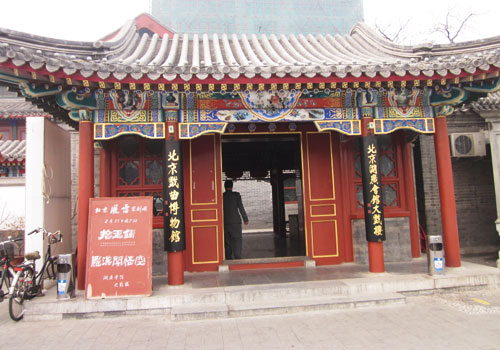Living antique: Peking opera lives on at Beijing club
|
The traditional-looking entrance of the Huguang Club contrasts with the modern construction sites surrounding it. [Photo: CRIENGLISH.com] |
While much of Beijing's traditional Xuanwu District undergoes modern reconstruction, the Huguang Club on Hufang Road stands as a testament to the neighborhood's historic roots.
The club's history dates back to 1807, when it was built as a meeting place for scholars, businessmen, and high-ranking officials from Hunan and Hubei provinces. At that time, the two provinces were together referred to as Huguang Province.
"The Huguang Clubhouse was built by high-ranking officials from the Qing Dynasty to serve as an entertainment venue and gathering place, so it's different from an ordinary clubhouse," said Huo Jianqing, current general manager of the Huguang Club.
In 1830, the club added an opera house to serve as a prime venue for the blossoming art of Peking opera. During its lifetime, the opera house has served as a performance center for several of Peking opera's most famous performers, including Chen Delin, Mei Lanfang, Tan Xinpei and Yu Shuyan.
The Huguang Club made history again on August 8, 1912, as the birthplace of the Kuomintang party. Sun Yat-sen chose the club as a meeting place because many of Beijing's important revolutionaries lived in nearby neighborhoods.
Now a tribute to old Beijing, the Huguang Club currently houses a restaurant, teahouse, opera house and small museum complete with interior courtyards and talkative mynah birds in hanging cages. The attendants are friendly and enthusiastic as they welcome visitors to the club.
Photos of various Peking opera stars appear on the walls of the complex, but the real gems are located in the club's one-room museum. The attendant doesn't speak English, but is happy to answer any questions from visitors in Chinese. There is an exhibit about Sun Yat-sen's work on one wall, but the rest of the room is dedicated to Peking opera.
 0
0 







